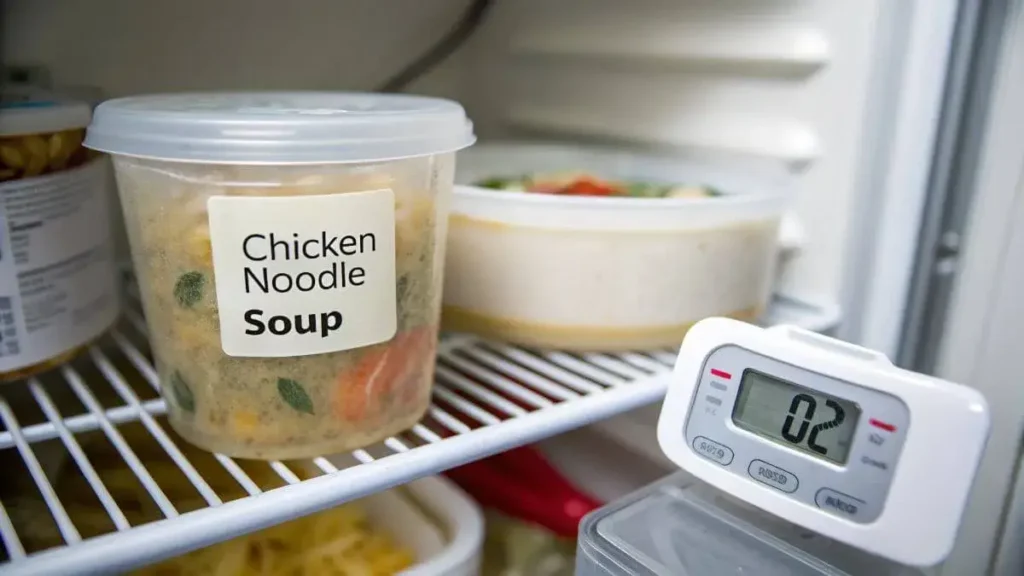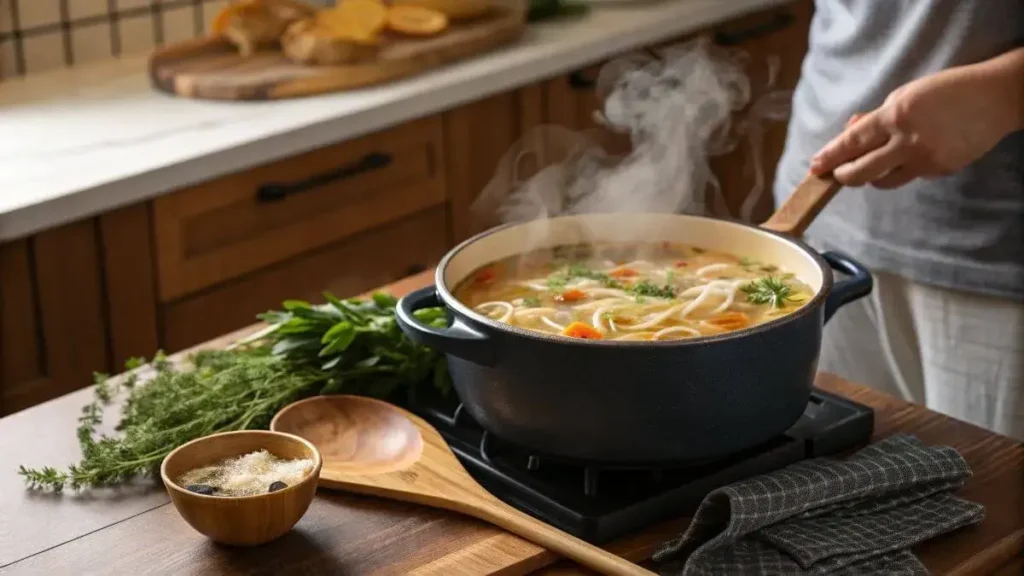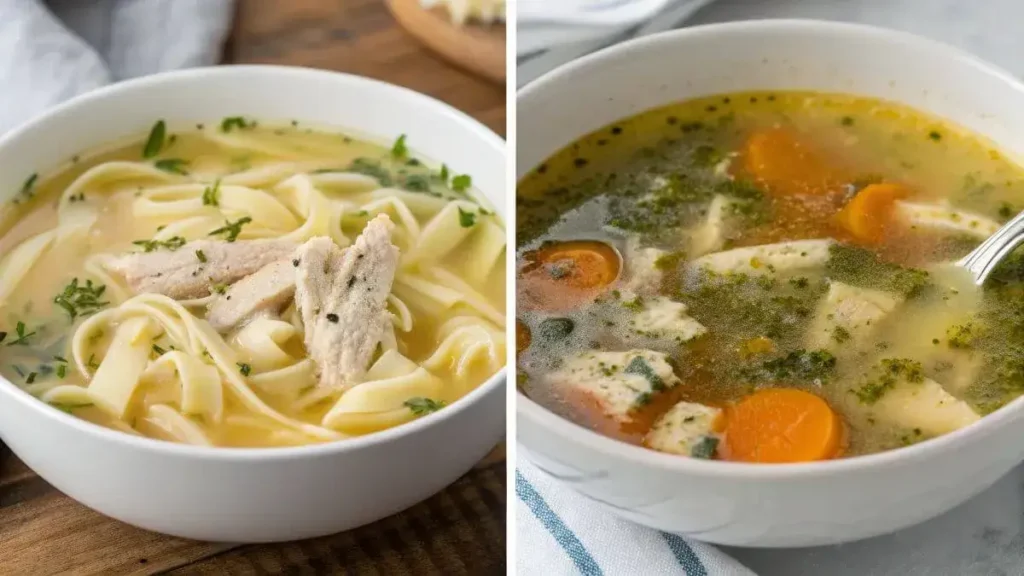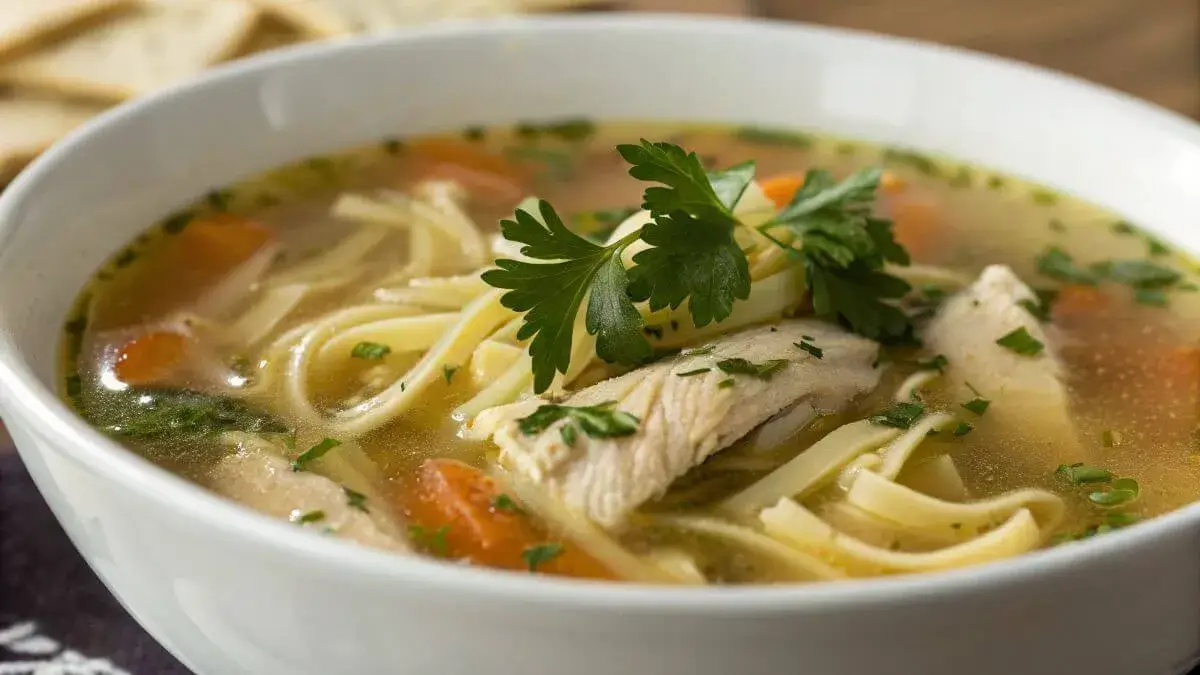Chicken noodle soup is the ultimate comfort food—warm, hearty, and perfect for cozy nights or fighting off a cold. But what happens when you find a forgotten batch in the back of your fridge? Can I eat chicken noodle soup after 5 days? This question is more common than you might think, and the answer isn’t always straightforward.
In this article, we’ll dive into everything you need to know about the shelf life of chicken noodle soup, from proper storage tips to signs of spoilage. We’ll also explore how to reheat it safely, creative ways to use leftovers, and why food safety guidelines are essential. Whether you’re a soup lover or just trying to avoid waste, this guide will help you enjoy your chicken noodle soup without risking your health. Let’s get started!
Introduction to Chicken Noodle Soup and Food Safety
Why Chicken Noodle Soup Is a Comfort Food Favorite
Chicken noodle soup has been a go-to dish for generations and good reason. It’s not just delicious—it’s also packed with nutrients that can help boost your immune system. From its humble beginnings as a home remedy for colds to its place on restaurant menus worldwide, this soup has earned its spot as a comfort food classic.
But here’s the thing: even the best soup can go bad if not stored properly. That’s where food safety comes in.
The Importance of Food Safety in Soup Storage
Proper storage is crucial for the shelf life of chicken noodle soup. If soup is left out too long or refrigerated improperly, it can lead to bacterial growth, increasing the risk of food poisoning. Symptoms like nausea, vomiting, and stomach cramps are no joke—so it’s worth taking a few extra steps to keep your soup safe.
Can I Eat Chicken Noodle Soup After 5 Days? The Big Question
This is the question on everyone’s mind: Can I eat chicken noodle soup after 5 days? The short answer is: it depends. While some soups might still be safe to eat, others could be a breeding ground for bacteria. In the following sections, we’ll break down the factors that affect soup safety and how to tell if your soup has gone bad.
Understanding the Shelf Life of Chicken Noodle Soup
How Long Does Chicken Noodle Soup Last in the Fridge?
When it comes to chicken noodle soup shelf life, timing is everything. Generally, homemade soup lasts about 3-4 days in the fridge, while store-bought versions might last longer due to preservatives. However, these timelines aren’t set in stone. Factors like the freshness of ingredients and how the soup was stored can make a big difference.
So, can I eat chicken noodle soup after 5 days? While it’s possible, it’s not always safe. By day 5, the risk of bacterial growth increases significantly, especially if the soup isn’t stored correctly.
Factors That Affect Soup Shelf Life
Several things can impact how long your soup stays fresh:
- Ingredients: Fresh vegetables and chicken spoil faster than canned or frozen ones.
- Storage Temperature: Your fridge should be at or below 40°F (4°C) to slow bacterial growth.
- Container Type: Airtight containers keep out contaminants and help maintain freshness.
Understanding these factors can help you make smarter decisions about your soup.
Why 5 Days Is a Critical Timeframe
Five days is often the tipping point for soup safety, and by then, harmful bacteria like Listeria or Salmonella may have multiplied to dangerous levels. Even if the soup looks and smells fine, eating it could still be unsafe. That’s why it’s crucial to follow food safety guidelines and err on the side of caution.
Signs Your Chicken Noodle Soup Has Gone Bad
How to Tell If Chicken Noodle Soup Is Spoiled
Is your soup still good? Here are some clear signs it’s time to toss it:
- Visual Signs: Look for mold, discoloration, or a slimy film on the surface.
- Smell: A sour or off-putting odor is a red flag.
- Taste: Spit it out immediately if you’re brave enough to taste it and it seems off.
These signs are your body’s way of saying, “Don’t eat this!”
What Happens If You Eat Spoiled Soup?
Eating spoiled chicken noodle soup can lead to food poisoning, with symptoms like nausea, vomiting, diarrhea, and stomach cramps. In severe cases, you might need medical attention. The bacteria responsible, such as Salmonella or E. coli, thrive in improperly stored food. So, if you’re asking, can I eat chicken noodle soup after 5 days?—think twice. The potential consequences aren’t worth the risk.
Can I Eat Chicken Noodle Soup After 5 Days If It Looks Fine?
Even if your soup looks and smells fine, it’s not always safe. Harmful bacteria don’t always produce obvious signs of spoilage. Following the food safety guidelines and discarding the soup is better when in doubt. After all, wasting a bowl of soup is better than risking your health.
Proper Storage Tips for Chicken Noodle Soup
How to Store Chicken Noodle Soup to Keep It Fresh

Proper storage is the key to extending the shelf life of chicken noodle soup. Here’s how to do it right:
- Use Airtight Containers: Store soup in containers with tight-fitting lids to prevent contamination. Glass or BPA-free plastic containers work best.
- Cool It Quickly: Let the soup cool to room temperature before refrigerating, but don’t leave it out for more than 2 hours.
- Label and Date: Write the date on the container so you know when it was made.
Following these steps, you can keep your soup fresh and safe.
Can You Freeze Chicken Noodle Soup?
Yes, freezing is a great way to extend the life of your soup. Here’s how:
- Portion the soup into freezer-safe containers or bags.
- Leave some space at the top for expansion.
- Label with the date and freeze.
When you’re ready to eat, thaw it in the fridge overnight and reheat thoroughly. Freezing not only extends the shelf life but also locks in flavor.
Common Mistakes to Avoid When Storing Soup
Even with the best intentions, mistakes happen. Here are some pitfalls to avoid:
- Leaving Soup Out Too Long: Bacteria multiply rapidly at room temperature.
- Reheating Multiple Times: Each reheating cycle increases the risk of contamination.
- Using the Wrong Containers: Non-airtight containers can lead to spills and spoilage.
By avoiding these mistakes, you can safely enjoy your chicken noodle soup and prevent the dreaded question: Can I eat chicken noodle soup after 5 days?
Reheating Chicken Noodle Soup Safely
How to Reheat Chicken Noodle Soup Without Losing Flavor

Reheating chicken noodle soup might seem simple, but doing it wrong can ruin flavor and safety. Here’s how to do it right:
- Stovetop Method: Pour the soup into a pot and heat it on medium until it reaches 165°F (74°C). Stir occasionally to ensure even heating.
- Microwave Method: Use a microwave-safe bowl and cover the soup with a lid or microwave-safe wrap. Heat in 1-minute intervals, stirring in between.
- Oven Method: For more significant portions, reheat the soup in an oven-safe dish at 350°F (175°C) until hot.
No matter the method, always check the temperature with a food thermometer to ensure it’s safe to eat.
Can You Reheat Soup More Than Once?
While it’s tempting to reheat leftovers multiple times, it’s not the best idea. Each reheating cycle increases the risk of bacterial growth. Instead, portion your soup into smaller servings and only reheat what you plan to eat. This way, you can enjoy your soup without worrying about food safety guidelines.
Tips for Maintaining Flavor and Texture When Reheating
Reheated soup can sometimes lose its charm. To bring it back to life:
- Add fresh herbs like parsley or cilantro.
- Toss in a handful of fresh noodles or vegetables.
- Avoid overcooking, as noodles can become mushy.
Following these tips, you can enjoy your chicken noodle soup as if it were freshly made.
For more delicious recipes, check out our Homemade Chicken Noodle Soup Recipe for a step-by-step guide.
FAQs About Eating Chicken Noodle Soup After 5 Days

Can I Eat Chicken Noodle Soup After 5 Days If It Smells Fine?
Even if your soup smells fine, it’s not always safe. Harmful bacteria like Listeria or Salmonella don’t always produce a foul odor. If you’re asking, can I eat chicken noodle soup after 5 days?—It’s best to follow the food safety guidelines and discard it in the fridge after 3-4 days.
How Long Does Homemade Chicken Noodle Soup Last Compared to Canned?
Homemade soup typically lasts 3-4 days in the fridge, while canned soup can last 5-7 days after opening. However, always check for signs of spoilage, like an off smell or slimy texture, before eating.
Can I Freeze Chicken Noodle Soup After 5 Days in the Fridge?
Freezing soup after 5 days isn’t recommended. By then, the soup may already have bacterial growth. It’s safer to freeze it within 2-3 days of making it.
What Are the Best Containers for Storing Chicken Noodle Soup?
Airtight glass or BPA-free plastic containers are ideal. They keep the soup fresh and prevent leaks. Mason jars with secure lids also work well for smaller portions.
Is It Safe to Eat Chicken Noodle Soup Left Out Overnight?
No, soup left out at room temperature for more than 2 hours (or 1 hour in hot weather) should be discarded. Bacteria multiply quickly in the danger zone between 40°F and 140°F (4°C and 60°C).
Conclusion and Final Thoughts
Key Takeaways About Eating Chicken Noodle Soup After 5 Days
So, can I eat chicken noodle soup after 5 days? The short answer is that it’s risky. While some soups might still seem okay, the potential for foodborne illness isn’t worth it. Always prioritize food safety guidelines and trust your senses—if something seems off, it probably is.
Why Prioritizing Food Safety Is Essential
Food safety isn’t just about avoiding waste but protecting your health. Harmful bacteria can cause serious illnesses, and spoiled soup is a common culprit. You can enjoy your meals without worrying by following proper storage and reheating practices.
Encouragement to Enjoy Chicken Noodle Soup Responsibly
Chicken noodle soup is a comforting dish that deserves to be enjoyed safely. Whether making a fresh batch or repurposing leftovers, always store and reheat it properly. And if you’re ever in doubt about its freshness, don’t hesitate to toss it.
Check out our Homemade Chicken Noodle Soup Recipe for more tips on making and storing delicious meals. Stay safe, and happy cooking!
Health Benefits of Chicken Noodle Soup
Why Chicken Noodle Soup Is Good for You
Chicken noodle soup isn’t just tasty—it’s also packed with nutrients that can boost your health. The broth is hydrating and easy to digest, while the chicken provides protein to help repair tissues. Vegetables like carrots and celery add vitamins and minerals, making this soup a well-rounded meal.
Plus, it’s often called “Jewish penicillin” for a reason. The warm broth can soothe a sore throat, while the steam helps clear nasal congestion. So, if you’re feeling under the weather, a bowl of chicken noodle soup might be just what the doctor ordered.
How to Make a Healthier Version of Chicken Noodle Soup
Want to make your soup even healthier? Here are a few tips:
- Use low-sodium broth to reduce salt intake.
- Swap regular noodles for whole-grain or veggie-based options.
- Add extra veggies like spinach, kale, or zucchini for more nutrients.
You can enjoy a healthier version of this classic dish by making these small changes.
Common Myths About Soup Storage and Safety
Myth: Soup Is Safe as Long as It’s Reheated
Many people think reheating soup kills all bacteria, but that’s not always true. While reheating can reduce bacteria, it doesn’t eliminate toxins some bacteria produce. So, if your soup has been sitting in the fridge for too long, reheating won’t make it safe to eat.
Myth: Freezing Soup Makes It Last Forever
Freezing soup is a great way to extend its life, but it’s not a magic solution. Over time, frozen soup can develop freezer burn, which affects its flavor and texture. For the best results, use frozen soup within 2-3 months.
Myth: Homemade Soup Is Always Safer Than Store-Bought
While homemade soup can be fresher, it’s not automatically safer. Improper storage or handling can spoil any soup, whether homemade or store-bought. Always follow food safety guidelines to keep your soup safe to eat.
So, can I eat chicken noodle soup after 5 days? The answer depends on how it’s been stored and handled. By debunking these myths, you can make smarter choices about your soup.

